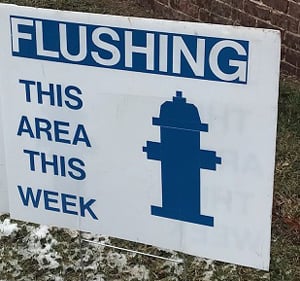~ Submitted by Bedford’s Community Emergency Response Team ~ CERT
 Are you ready for the next storm, power outage, road closure or other event? The degree to which you are prepared can make the difference between an inconvenience and a disaster. The Bedford CERT (Community Emergency Response Team) has coordinated with Town Public Safety officials in preparing some tips for you to ensure you ARE ready!
Are you ready for the next storm, power outage, road closure or other event? The degree to which you are prepared can make the difference between an inconvenience and a disaster. The Bedford CERT (Community Emergency Response Team) has coordinated with Town Public Safety officials in preparing some tips for you to ensure you ARE ready!
Happy Spring? Good News/Bad News…
The good news is that we have made it through the winter (barring any lurking meteorological “surprises”), and Spring has sprung, at least on the calendar, but recent weather has shown some promise of nicer things to come.
The bad news is that we need to deal with April showers before we get to the May flowers and the distant promise of summer. The Bedford Department of Public Works (DPW) has posted the following information:
“The rivers in and around Bedford have been flowing at higher than normal levels and ground water is already high for the season. For example, the Shawsheen River has been flowing at a level in February 2022 that is twice the average volume of February flows over the last twenty-five years.
Based on these current water levels, there is a good chance that throughout the spring months residents will encounter higher than normal water on their property.”
As such, homeowners may want to take steps to address potential surface water issues on and around their property. The DPW has a new program this year to make sand and (empty) sandbags available to Bedford residents, beginning April 1st, so you can make up your own sandbags if necessary. For more information on this program please refer to their article in the Citizen and on the Town website. [links]
Be Ready!
Preparing sandbags is but one step residents can and should take to help them “Be Ready” for the change in season. The Town of Bedford has many resources to help residents deal with emergencies of various types. In most cases, however, YOU, the resident, are the first line of defense against “unplanned events”. One of the best things you can do is EXPECT the UNEXPECTED and prepare for situations that may arise. Planning ahead and having some essential supplies on hand can help you to “weather the storm”, whatever form it may take.
Fire Chief David Grunes has this advice: “We want residents to be prepared for any type of emergency and be proactive in developing and updating a plan that will keep their families and themselves safe … You don’t want to wait until disaster strikes to make a plan or gather supplies, so it is important to take time now to plan”. All residents are urged to make a plan, or update it if you already have one.
Water, water…
In Bedford we generally see two types of flooding:
- River Flooding – this is relatively rare and usually occurs after a lot of rain (very heavy and/or over an extended period) in the spring. The flooding that occurs comes on gradually and is usually not a surprise and occurs in the same areas. This gives affected residents some time to prepare.
- Flash Flooding – this usually occurs in late spring and summer due to very heavy rain often associated with thunderstorms. Flash flooding may generate a few inches of rain in an hour. The flooding that occurs comes on very quickly but tends to be very localized.
Be Ready for Spring Flooding
So, what can you do?
- Be aware of places in and around Bedford with a higher risk of flooding. We have a number of rivers and streams meandering through town and nearby streets and low-lying areas may be at higher risk. Know about the types of flood risk in your area. Visit FEMA’s Flood Map Service Center here for maps and other resources.
- Monitor the conditions for flood watches and warnings. Alerts may also be sent to your mobile phone. Click here for more information on these “Wireless Emergency Alerts” (WEAs). Flash flood warnings now have damage threat tags, so WEAs will be issued for only the most life-threatening flood events with a damage threat tag of “considerable” or “catastrophic.” This change will significantly reduce the number of WEAs for flash flooding, but any alerts should be taken seriously.
- Another resource is the North East River Flooding Center which puts out a daily briefing here: https://www.weather.gov/nerfc/briefings
- If you have had problems in the past you may have one or more sump pumps. It’s a good idea to check them BEFORE the rain starts, to be sure they’re ready to go. If you have a backup generator, check that too. Don’t just start it, connect it to be sure it’s actually making electricity!
- Check your gutters and downspouts to ensure that they are clear and positioned to guide water away from the home.
- Elevate items in the lower levels of your house to prevent damage or move them upstairs.
- Likewise, if you’re in or near a flood plain area, consider taking out flood insurance as many basic property insurance policies do not cover flood damage (from groundwater). You can find more info from FEMA here.
- Have a plan – so that you and your family know what to do, where to go, and how to protect yourselves from flooding. In particular, be aware of roads in your area that may be prone to flooding and avoid them if you need to travel.
- Have a “Go Kit” ready if there’s a chance you might need to evacuate. Some ideas and lists from FEMA may be found here, or see a sample 72-hour kit prepared by CERT here; use either as a starting point to create your own customized list adjusted to meet your specific needs.
- Turn around. Don’t drown! Do not walk, swim, or drive through floodwaters. Just six inches of fast-moving water can knock you down, and one foot of moving water can sweep your vehicle away. The depth of water is not always obvious and may change rapidly. The road may be washed out under the water, and you could be stranded or trapped.
- Remember: water and electricity don’t mix! Stay clear of any powered wires or electrical equipment (inside or outside) if you’re standing in water or on wet ground.
Much more information is available at https://ready.gov/floods, and by searching the Bedford Town Website here.
This article is brought to you by Bedford CERT (the Community Emergency Response Team), a volunteer group which supports the Town of Bedford and its emergency response organizations in preventing and mitigating emergencies. Click here for more information about CERT in Bedford. Watch for future articles to help you to be ready for any emergency which might come your way.





























